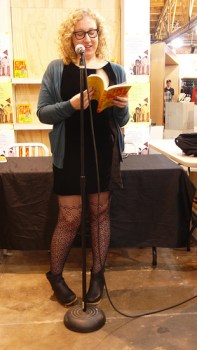 If not for Marisa Meltzer, Autostraddle.com would not exist. Not like we know her, or any of us had talked to her until this interview, or she even necessarily knows of her crucial role in our site’s development. But, as the legend goes, it was while reading How Sassy Changed My Life that our Editor-in-Chief decided once and for all to start an online magazine that could provide Sassy-esque community for lesbians and other weirdos without forsaking fun or feminist empowerment. If you haven’t read that book, you need to go grab a copy right freakin’ now and then COME BACK because you need to read this interview!
If not for Marisa Meltzer, Autostraddle.com would not exist. Not like we know her, or any of us had talked to her until this interview, or she even necessarily knows of her crucial role in our site’s development. But, as the legend goes, it was while reading How Sassy Changed My Life that our Editor-in-Chief decided once and for all to start an online magazine that could provide Sassy-esque community for lesbians and other weirdos without forsaking fun or feminist empowerment. If you haven’t read that book, you need to go grab a copy right freakin’ now and then COME BACK because you need to read this interview!
I’m just old enough to have read Sassy during its heyday (its decline began in ’94, when I was 13), which is one of many reasons I often felt I had the unfortunate luck of being born three or four years too late; just shy of Generation X and too old for Generation Y. This happens in every generation, obviously; many women of all ages can relate to just missing being one of the Greatest or the 60s-70s counterculture.
This is all to say that I just missed being a teenager when riot grrrl began and consequently busted the underground music scene right open; challenging traditional gender roles, inspiring political activism, kick-starting the ‘zine movement, creating new fashion icons and re-writing sexual politics. Women were wearing weird clothes and changing my world and there I was in stirrup pants and over-sized sweaters, reading about Kristy’s Big Idea.
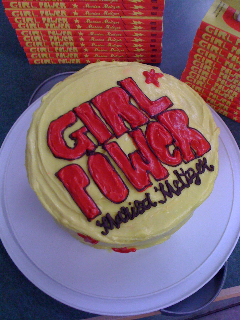 This is where Marisa Meltzer comes in — at least for me. Marisa has written a little primer for you re: riot grrrl and how it not only started third wave feminism, but also rippled out into mainstream pop music / culture. Her second book, Girl Power, is by no means an anthology of the nineties, nor does it claim to be. Marisa is truly speaking from her own knowledge and experience, in an effort to create conversation and further exploration of what the nineties riot grrrl thing meant to girls, feminism, and the future.
This is where Marisa Meltzer comes in — at least for me. Marisa has written a little primer for you re: riot grrrl and how it not only started third wave feminism, but also rippled out into mainstream pop music / culture. Her second book, Girl Power, is by no means an anthology of the nineties, nor does it claim to be. Marisa is truly speaking from her own knowledge and experience, in an effort to create conversation and further exploration of what the nineties riot grrrl thing meant to girls, feminism, and the future.
When I began research for this interview, I immediately found Marisa’s Tumblr, her other Tumblr, Salad for Breakfast, and an awesome blog – 90’s Woman – which’s this great collab between Kara Jesella (co-author of How Sassy Changed My Life WHAT YES I’M SERIOUS) and Ada Calhoun. Then Emily Gould did this perfect Cooking The Books with Marisa during which Emily wore the perfect shirt and they were both hilarious and I ALMOST DIED BUT DIDN’T.
Cooking the Books — Episode 5 — Marisa Meltzer from The Awl on Vimeo.
Here’s the deal, internet: while Girl Power may not be the be-all and end-all of nineties pop culture info, it’s a thoughtful look at a decade that was pretty fucking recent and for many of us remains emotionally accessible. It doesn’t skim over the race / class divide that existed within riot grrrl, nor does it downplay the importance of everything after Bikini Kill. It empowers you with history and facts and might even inspire you to kick some ass! Or like, read more books and make a zine for your friends. OR ALL THREE.
Laneia: What made you want to write a book about the intersection of music and feminism in the nineties?
Marisa: When Sleater-Kinney broke up in 2006, I had a personal crisis. I emailed a friend to be like, “My youth is over.” I pitched a story to Slate on their breakup and told my editor about how I had seen them on their first tour and had gone to college in Olympia. He said that I should write it, and that I should include some of my personal history there.
Once I wrote 1000 words or so I realized I had so much more to say. Plus I was turning 29 and The Pussycat Dolls were topping the charts and suddenly everything I had held dear in the nineties felt like it was going away without a fight. Musicians like Alanis or The Spice Girls suddenly seemed way less insipid than I had previously written them off as, so I reevaluated the last twenty years.
Laneia: Yeah when compared to The Pussycat Dolls, Alanis looks like a wise old sage.
Marisa: She’s like Ani Difranco in comparison!
Zines, Zines, Zines!! / Everyone Lives in Brooklyn
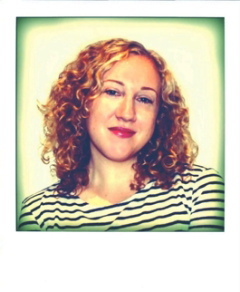 Laneia: What do you hope Girl Power accomplishes?
Laneia: What do you hope Girl Power accomplishes?
Marisa: I hope that it will get readers to think about what might be missing from culture now. I hope that girls who were too young for most of the bands in it to start seeking out Pussy Whipped or Exile in Guyville or The Last Splash. And also doing things like starting zines or bands or feminist communities in their own lives.
Laneia: Did you make zines in the nineties?
Marisa: I had one issue of a zine in high school. It was called And She Whispered Secrets in My Ear.
Laneia: That’s a serious title.
Marisa: There was definitely a first-person essay about street harassment and puberty in it. I took myself really seriously as a teenager. I cringe now.
Laneia: No I think most of us did.
Marisa: And now my friend Elizabeth and I are doing a zine called First Kiss and it’s all stories of first kisses. That will probably come out in April. And then she and I are doing a 90210 concept zine to be released on 9/02/10.
Laneia: Um hello, that’s genius. I saw on your Tumblr that you were doing the First Kiss zine! Will it be slick or basic?
Marisa: It will be really basic and raw. It’s propelled by the stories, which are great. They include all the heartbreak and awkwardness of adolescence.
Laneia: I hope there’s a pre-order option for First Kiss because I’m actually quite excited about it. Do you read any zines right now that you could recommend?
Marisa: I’ll make sure you get to pre-order First Kiss. There’s a zine that these two boys in Brooklyn do called Perineum. Each issue is different. The next is, I believe, about luck. I also really love Aaron Lake Smith’s zines. He also lives in Brooklyn.
Laneia: Everyone lives in Brooklyn, Marisa.
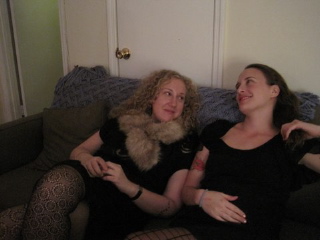
Marisa: I spent some time in the Barnard zine library for research. Their zine librarian, Jenna, is great.
Laneia: Wait, such a thing exists?? A ‘zine library?
Marisa: Yes! Many schools have ‘zine collections.
Laneia: My entire life just changed.
Marisa: I believe Duke has a good one as well. [Bingham Center Zine Collection] They have the bitch and Bust magazine archives. Jenna from Barnard has a blog called Lower East Side Librarian. I did a reading for the Sassy book at a zine library in Cambridge [Papercut].
Laneia: I had no idea this was a thing. I am seriously seriously excited about the future now because it will involve me seeing these things!
Marisa: Please come out and visit NY.
Laneia: I’ve never actually gazed upon a real ‘zine. Like, from the nineties.
Marisa: Oh, then you absolutely should. I think that there must be some ‘zine collections in LA.
Laneia: I will FIND THEM.
Marisa: I’m excited for people to be making zines again. A ‘zine is such a good creative outlet. I treasure zines people give me the way I treasure mix tapes.
Books, Music, Movies / The Girls in the Band Know How to Get Down
Laneia: You talk about the birth of Lilith Fair in Girl Power. Will you be going this summer?
Marisa: Yes! I have plans to go with two of my best friends, Kara and our friend Jon, who is a boy and straight. Lilith truly unites.
Laneia: I was kind of saddened by Carrie Brownstein’s article on Monitor Mix about it.
Marisa: I was such an asshole about Lilith when it first came out. But now I’m like, “What was my problem?” Not all women have access to spaces by and for women. The bands are female, they donate money to local charities. And Heart and Mary J Blige are both playing. What is not to like? I get that they could go much more radical or more hip. But I appreciate Lilith’s attempt at mass appeal.
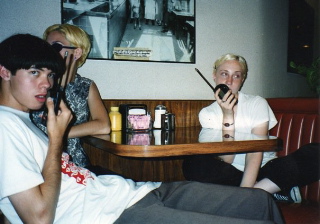
Laneia: I definitely appreciate and look forward to it. I’m crossing my fingers that Beth Ditto and Loretta Lynn do an impromptu duet. But yeah, it’s sort of like, a Baskin Robbin’s approach to female entertainers.
Marisa: And maybe you start out thinking that Baskin Robbins makes the best ice cream you’ve ever had. And then you discover Ben and Jerry’s. And soon you move so far beyond 31 Flavors that you’re eating caramel balsamic at Humphry Slocombe in San Francisco. That’s how taste works for most of us, I think. It’s how it worked for me.
Laneia: The biblio / filmography for Girl Power is frackin’ HUGE. What was the best thing you read / watched while researching this book?
Marisa: I loved seeing Ladies and Gentlemen, The Fabulous Stains for the first time. It finally came out on DVD while I was researching the book.
Laneia: OMG THAT MOVIE MARISA.
Marisa: That movie is so important!
Laneia: Loved that movie! I watched it last summer! How had I gone my whole enitre life without knowing about that movie?! Like, it was a total secret to me.
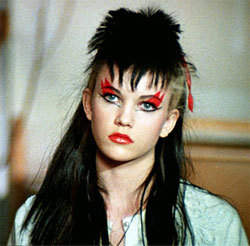
Marisa: Because it never even really came out! And then Sarah Jaconbson, the director, was making a documentary about it, but she died before it was finished.
I went to a viewing of it at Lincoln Center and they gave out buttons that say I DON’T PUT OUT.
Laneia: Um, that’s perfect.
Marisa: I’m trying to think of what book was most influential. I read Our Band Could Be Your Life during the Sassy book research. Have you read that?
Laneia: No. But of course now I will.
Marisa: You should. It’s the story of a bunch of seminal bands from the 1980s indie scene, like Sonic Youth and Fugazi and The Replacements. Each band has its own chapter. And some of the bands I wasn’t necessarily the biggest fan of (like The Butthole Surfers) have the best stories. It’s wildly entertaining but it also sets the stage really well for understanding everything that happened with music in the nineties.
Beth Ditto / Kids Today
Laneia: In the Slate.com discussion with Sara Marcus [Exile From Grrrlville], you mention being curious about what kind of impact nontraditional pop stars, like Beth Ditto et al, will have on adolescent pop culture. What do you think / hope that impact will be?
Marisa: I believe the impact will be positive. What would it be like to grow up with Beth Ditto on your bedroom wall? Even Lady Gaga is a step in the right direction. Of course I really hope girls (and boys) will have JD Samson posters on their walls. I wish she would make another calender…
Laneia: Can we talk about Camp Trans? It’s one of my favorite parts of Girl Power, weirdly.
Marisa: I wasn’t there for long, so most of it is in the book. But on an aesthetic level, I think I understood it much more easily than I understood the Michigan Womyn’s Music Festival. It felt more like my generation and the DIY attitude felt very punk. But it was also a lot less fancy than Michigan.
Laneia: Seems like Michigan is already not very fancy. Would you go back to Camp Trans?
Marisa: Yes, absolutely. I want to go with a bigger group of friends. No, Michigan’s not fancy. Well, there are some women (womyn!) who go bananas with their tent set ups — with inflatable beds and duvets. But I was camping. Wait, I have a hilarious photo of me at Michigan. Let me show you.
Laneia: Yes please do. [this link is shared] I feel like that sign is promoting group sex.
Marisa: The sign might be. Each path had names like that, which was a source of constant amusement.
Laneia: Like ‘Areola Avenue’?
Marisa: I think you have a calling.
Buy Girl Power: The Nineties Revolution in Music at Amazon.com.








Comments
Laneia, this is great. More 90’s/zine/riot grrrl stuff please.
i could write a personal journal-type essay documenting the creation of the zine i’m working on! no, really. i could.
I emailed Intern Lily in all caps when I found out about the Barnard ‘zine library. If she hasn’t already gone, i am going to make her go very soon b/c I feel inspired. Maybe they would like a copy of Lunette, the fantastic ‘zine we made one issue of in 1996. Or the Auto-Insonia ‘zine obvs.
Anyhow enough about me. I love this interview, love that we did it and love that Marisa’s face is on our front page. My dream for the internet is that it can capture some of what riot grrl did by providing new avenues for like-minded women to interact. La la la. I’m going to read this book!! Also I’m going to Lilith Fair
i propose / demand a second printing of Auto-Insomnia.
I also love that Amazon’s related products box wants us to get Powerpuff Girls. Apparently they have an album, who knew.
I’d never heard of Ladies and Gentlemen, the Fabulous Stains until this interview, what is wrong with me. I also haven’t read How Sassy Changed My Life, and like a gabillion other things mentioned here. Obviously i have a lot of reading to do! I will start with Girl Power.
–
Also it was so sad when Sleater-Kinney broke up. My Women’s Studies profs (and fellow students) were like, grieving. I played All Hands on the Bad One for days. It was a sad, sad time.
–
This was a great interview! I can’t believe the 90s were 20 fucking years ago, god I feel old.
a) you HAVE to see Ladies and Gentlemen, the Fabulous Stains and you have to see it SOON.
b) you are old.
Hmmm… I missed riot grrrl by about 16 years. It kinda makes me sad that there isn’t really a feminist/punk/DIY movement of that nature now.
There is, it’s called Autostraddle. :)
yeah, there’s Autostraddle!
also, you could start your own feminist / punk / DIY movement locally! that would be totally Revolution Girl Style Now!, etc.
Also, hello I love this. Laneia’s interviews always always always make me feel smarter and happier about the world! I’m purchasing Marisa’s book as soon as my next paycheck appears.
o.m.g. stirrup pants … i might need therapy. But for serious, this article makes my 90s lovin, womens and gender studies heart flutter. :) Thanks!
whatever i bet you looked supercute in those stirrup pants. the worst part, aside from the fact that they were stirrup pants, was the knee puckers! you know?
This interview was the best part of my day. Thank you, Laneia!
this comment was the best part of my day. thank YOU, sam! <3
I got my copy of Ladies and Gentlemen, the Fabulous Stains yesterday in the mail and I finally got to watch it. I loved it. Thank you, again.
i really need to buy a copy too. i only rented from netflix and that just won’t do.
rhyme thyme!
laneia, fyi kathleen hanna just donated her entire zine collection to NYU’s fales library! you guys actually posted an interview with her and she talked a little bit about it. if you want to read up on it more check out this article:
http://www.thelmagazine.com/TheMeasure/archives/2010/01/07/nyu-libraries-acquire-the-kathleen-hanna-papers-for-their-new-riot-grrrl-collection
um, duh, i work here!
j/k! but srsly, we discussed kathleen hanna donating her stuff to NYU but i cut that from the interview b/c it wasn’t anything new.
also cut from the interview was when marisa said it was totally cool if i considered myself her slightly dorkier, long-lost little sister AND she invited me to brooklyn’s farmer’s market for homemade popsicles! b/c it seemed braggy to leave that in, you know?
thanks for the link, though!
just braggy enough to put in the comments though ;D no prob boo.
btw- totally off topic, but is your DIY column coming back? i loved it, and i actually just got my first apartment so i need some ideas on how to utilize teensy spaces.
hahaha YES ;)
the DIY column is definitely coming back! my life got a little complicated last fall, so the column had to take a backseat for a while. it should be back by mid-spring! if you have anything specific you’d like to see, shoot me an email.
Sleater Kinney played here in Iceland a few months before they broke up and they were skullfuckingly awesome
Did you notice anything odd about the audience? I saw them once about ten (omg TEN) years ago and was struck by how short everyone at the gig was, and wondered whether the entire midget lesbian population of the north of england was in attendance.
They were great, but my overriding memories were of the shortness, and also good banter with people trying to confuse them with the mystique of british bread products.
No but then the midget lesbian population of iceland is 6(used to be 7 but one moved to denmark).
is it weird that i spent like 10 minutes trying to tell you how funny this comment is and i only came up with this?
yet i feel all warm inside
Yes, skullfuckingly awesome is the PERFECT was to describe them. I saw their last NYC show before they broke up and it was actually a religious experience. I may have cried.
i want to do something skullfuckingly awesome in iceland! DAMN.
And here i am dreaming of new york and L.A. like most young icelanders.
TRADESIES
deal
Loved reading this. It made me all nostalgic for my youth spent reading magazines in the library and the pre-Facebook/Twitter world. Really interested in How Sassy Changed My Life – ordering NOW.
i really do miss folded notes passed in the halls between class. like, now ppl probs just txt their every thought? that’s sad.
HSCML will make you so eternally happy, jess. on the reals.
ah, thanks for linking that carrie brownstein article- def a few things to think about there. i’ll try to uncloud my judgment, as meeting carrie brownstein very briefly at a concert in high school was perhaps my #1 coming out moment of enlightenment ever.
i didn’t know beyonce was touring with an all-female band…that’s really sweet!
also THIS
“When Sleater-Kinney broke up in 2006, I had a personal crisis.”
I did too. And I was already in the throes of an ongoing crisis from not being old enough to be properly involved with the riot grrl days of yore (And didn’t discover Sleater-Kinney until 2000 or so. But happily, i don’t believe in too much idle nostalgia, so I won’t dwell on when I got born too much, EVEN THOUGH IT WAS CLEARLY A MISTAKE I WAS NOT CONCEIVED EARLIER.
Great interview! And “How Sassy Changed My Life” is great too- I just hate when I can’t get a seat on the goddamn train to read it!
i think we should assemble a team [me, you, kelsey, crystal, sarah] to attend both bonnaroo AND lilith so we can write an in-depth analysis / comparison of the two festivals for AS. yeah? YEAH??
Oops! Didn’t close that parenthetical. So here!
)
Also fuck me for not being old enough for Sassy either (that was implied). I read Jane in high school and didn’t make the connection until like 2 weeks ago.
ALSO LANEIA YOU SAID FRACK geez why don’t ya write for Technostraddle already, you nerd!
TAYLOR! just b/c i’m a nerd doesn’t mean i’m qualified for Technostraddle. though i could probs write a personal essay on how DOOM scared the living shit out of me and made it so i can never play scary first-person games like that EVER AGAIN.
Sweet! Glad that one Music Fix sparked this awesome interview!
oh grrrlllll we had this interview set up long before it was in the music fix, we’ve got our fingers alll up on the 90s pulse. but i hope the music fix made people buy the book so we can all talk about it now!
i’d srsly like to hear someone else’s opinion of the section dedicated to the Spice Girls. HINT!
“oh grrrlllll we had this interview set up long before it was in the music fix, we’ve got our fingers alll up on the 90s pulse.”
I thought you were going somewhere else with that …
Also, so late in catching up, but this was a great interview and I learned a bunch from it! Thanks!
bizzzzzzzzle <3 she had a lot of really awesome film / book recommendations, yeah? so. exciting. !!
Although I’d never heard of Marisa Meltzer before now, I was however a teenager in the 90’s (yeah, how old do I feel now-thanks!) Here in the UK, that decade was a mish-mash of musical influences, with the birth of both ‘Girl Power’ and Brit-pop. And yes thanks to the Spice Girls paving the way, more females were singing unapologetically about what they wanted, I mean really-really want-ed…zig-a-zig ahhh what I’d give to see Scary Spice face off with Swift!
Thanks Laneia, this article inspired me to go rooting through my old cassette collection, before returning to comment. So far I’ve come across Alanis, Salt n Pepa, oh er Joey Lawrence ahem*blush*, Maria McKee and hey my Party of Five soundtrack! OMG Stevie are you singing about Taylor in your opening lines on Free fallin, is that why you agreed to that duet??
So now I wanna watch Small Soldiers, read some zines, kick off the dust on my ol’docs and fall asleep to my mix tapes. I LOVE how you illuminate my day! :)
ummm, jealous. i don’t think i have any of my old tapes and my docs wouldn’t even fit me anymore!
Oh, it’s only because I’m a hoarder, I can’t bear to throw things away, I mean, you just never know when you might need them again. Look at the 80’s comeback now, although I’m still awaiting the appearance of silver sparkly head boppers!! Doesn’t stop at tapes either as I still have my vinyl singles/albums too(Robin Beck, Amazulu, Kim Wilde, Falco, Duran Duran, even have Dirty Dancing on vinyl too! damn I really hope someone else on here remembers these, I’m in my youthful 30’s I swear!!) Yes, it’s always an ordeal when I (attempt) to declutter!!
my favorite vinyl memory is of listening to a 45 of One Night In Bangkok, which i thought was by David Bowie [b/c i was a very assumptive 7 yr old] — it belonged to my babysitter, who was obvs the coolest girl in the world.
DIRTY DANCING SOUNDTRACK. this is my new goal. a couple of months ago, i found Annie at a record store and almost lost my minnnnnd i was so freakin happy.
You still have a record player too! I refuse to replace my stereo system (even though its the size of a bus) because it has a turntable section. Not that I’ve used it for ages,I’m ashamed to say. I also received D’dancin on casette as a xmas present, so I always played that, because I didn’t want to scratch my LP!!
Take a look at ebay…hopefully this link below will work!
http://cgi.ebay.co.uk/Dirty-Dancing-Vinyl-LP-1987_W0QQitemZ150421370096QQcmdZViewItemQQptZUK_Records?hash=item2305cff4f0
I am really excited about this post!
Thank you so much for introducing me to everything mentioned here.
i can’t wait to read Our Band Could Be Your Life!
Dude, there totally still is still a zine scene. And not all of it is immediately obvious – I just went on a zine buying binge (which adds up when you add on postage from Australia) and one of the packs was from the distro The Alchemist’s Closet, which mainly deals with zines on queer and trans theory & life. It’s a mix in quality and subject matter, some are a little taking-themselves-too-seriously but some are seriously fascinating.
(I can send you a package of some random ones if you’re interested!)
Also, check out the callout for the Girl Gang Underground zine:
http://www.girlgangunderground.org/
Autostraddle should totally have an article in there.
yes ppl are deffffinitely still making zines! i’ve picked up several from Microcosm Publishing and even Etsy!
YES PLZ SEND RANDOM PKG OF AUSTRALIAN ZINES THAT WOULD BE AMAZZZZZING OMG. i can give you the official Autostraddle mailing address!
checking out the Underground link now — thanks!
Well they’re not just Australian, they’re everywhere-ian, but I can definitely send some Aussie zines in there. :D